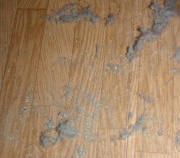Difference between revisions of "Dust"
Jump to navigation
Jump to search
(username removed) |
|||
| (2 intermediate revisions by 2 users not shown) | |||
| Line 2: | Line 2: | ||
== Description == | == Description == | ||
| − | Fine-grain, dry particles of inorganic and organic matter that are suspended in the air and are carried great distances by air currents. Dust deposits on horizontal surfaces and may be attracted or repelled by electrical charges. Dust can contain [ | + | Fine-grain, dry particles of inorganic and organic matter that are suspended in the air and are carried great distances by air currents. Dust deposits on horizontal surfaces and may be attracted or repelled by electrical charges. Dust can contain [[soot]], dirt, [[silica]], [[pollutant|pollutants]], animal and vegetable [[fiber|fibers]], skin and [[hair]] debris, pollen, bacteria, and [[mold (fungus)|mold]]. |
== Synonyms and Related Terms == | == Synonyms and Related Terms == | ||
| Line 8: | Line 8: | ||
particulate; dirt; Staub (Deut.); polvere (It.); poussière (Fr.); poeira (Port.) | particulate; dirt; Staub (Deut.); polvere (It.); poussière (Fr.); poeira (Port.) | ||
| − | == | + | == Risks == |
| − | Particles smaller than 2 microns may penetrate to the lungs. Chronic exposure may cause cancer. | + | * Particles smaller than 2 microns may penetrate to the lungs. |
| + | * Chronic exposure may cause cancer. | ||
| − | == | + | ==Resources and Citations== |
* Hermann Kuhn, ''Conservation and Restoration of Works of Art and Antiquities'', Butterworths, London, 1986 | * Hermann Kuhn, ''Conservation and Restoration of Works of Art and Antiquities'', Butterworths, London, 1986 | ||
| Line 20: | Line 21: | ||
* Pam Hatchfield, ''Pollutants in the Museum Environment'', Archetype Press, London, 2002 | * Pam Hatchfield, ''Pollutants in the Museum Environment'', Archetype Press, London, 2002 | ||
| − | * Art and Architecture Thesaurus Online, | + | * Art and Architecture Thesaurus Online, https://www.getty.edu/research/tools/vocabulary/aat/, J. Paul Getty Trust, Los Angeles, 2000 |
[[Category:Materials database]] | [[Category:Materials database]] | ||
Latest revision as of 11:45, 27 July 2022
Description
Fine-grain, dry particles of inorganic and organic matter that are suspended in the air and are carried great distances by air currents. Dust deposits on horizontal surfaces and may be attracted or repelled by electrical charges. Dust can contain Soot, dirt, Silica, pollutants, animal and vegetable fibers, skin and Hair debris, pollen, bacteria, and mold.
Synonyms and Related Terms
particulate; dirt; Staub (Deut.); polvere (It.); poussière (Fr.); poeira (Port.)
Risks
- Particles smaller than 2 microns may penetrate to the lungs.
- Chronic exposure may cause cancer.
Resources and Citations
- Hermann Kuhn, Conservation and Restoration of Works of Art and Antiquities, Butterworths, London, 1986
- Michael McCann, Artist Beware, Watson-Guptill Publications, New York City, 1979
- Pam Hatchfield, Pollutants in the Museum Environment, Archetype Press, London, 2002
- Art and Architecture Thesaurus Online, https://www.getty.edu/research/tools/vocabulary/aat/, J. Paul Getty Trust, Los Angeles, 2000
